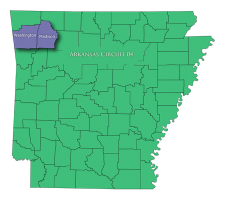Arkansas 4th Judicial Circuit
Ballotpedia provides comprehensive election coverage of the 100 largest cities in America by population as well as mayoral, city council, and district attorney election coverage in state capitals outside of the 100 largest cities. This court is outside of that coverage scope and does not receive scheduled updates.
The Fourth Circuit is one of 23 circuit courts in Arkansas. It serves Madison County and Washington County.[1]
Court
Divisions
The Fourth Circuit has 8 divisions, with one judge serving in each division.
- Doug Martin
- John Threet
- Dawn Egan
- Cristi Beaumont
- Beth Storey Bryan
- Matt Durrett
- Joanna Taylor
- Diane Warren[2]
Former judges
See also
External links
Federal courts:
Eighth Circuit Court of Appeals • U.S. District Court: Eastern District of Arkansas, Western District of Arkansas • U.S. Bankruptcy Court: Eastern District of Arkansas, Western District of Arkansas
State courts:
Arkansas Supreme Court • Arkansas Court of Appeals • Arkansas Circuit Courts • Arkansas District Courts • Arkansas City Courts
State resources:
Courts in Arkansas • Arkansas judicial elections • Judicial selection in Arkansas
Elections
- See also: Arkansas judicial elections
Arkansas is one of 43 states that hold elections for judicial positions. To learn more about judicial selection in Arkansas, click here.
- Arkansas local trial court judicial elections, 2025
- Arkansas local trial court judicial elections, 2024
- Arkansas local trial court judicial elections, 2023
- Arkansas local trial court judicial elections, 2022
- Arkansas local trial court judicial elections, 2021
- Arkansas local trial court judicial elections, 2020
- Arkansas local trial court judicial elections, 2019
- Arkansas local trial court judicial elections, 2018
- Arkansas local trial court judicial elections, 2017
- Arkansas local trial court judicial elections, 2016
- Arkansas judicial elections, 2014
- Arkansas judicial elections, 2012
- Arkansas judicial elections, 2010
Selection method
- See also: Nonpartisan election of judges
There are 122 judges on the Arkansas Circuit Courts, each elected to six-year terms. They compete in nonpartisan primaries (occurring at the same time as the primary elections for other state officials) in which the candidate who receives more than 50 percent of the vote wins the seat. If no candidate garners a majority of the vote, the top two candidates compete in a runoff during the general election.[3]
The chief judge of each circuit court is chosen by supreme court appointment. He or she serves in that capacity for an indefinite period of time.[3]
Qualifications
To serve on this court, a judge must be:[3]
- at least 28 years old;
- of "good moral character;"
- learned in the law;
- a U.S. citizen;
- a state resident for at least 2 years; and
- a legal practitioner for at least 6 years.
Election rules
General election
Judicial candidates compete in a nonpartisan general election on the same day as the primary for non-judicial elections. If no candidate wins a majority, the two candidates with the most votes participate in a runoff. If a runoff is required, it takes place on the same day as the general election for partisan races, and runoff candidates appear on the general election ballot.[4][5]
Footnotes
- ↑ Arkansas Judiciary, accessed April 12, 2014
- ↑ Arkansas Judiciary, "Circuit Judges," accessed April 25, 2025
- ↑ 3.0 3.1 3.2 American Judicature Society, "Methods of Judicial Selection: Arkansas," archived October 2, 2014
- ↑ Arkansas Secretary of State, "2014 nonpartisan elections calendar," accessed April 24, 2014
- ↑ Justia US Law, "§ 7-10-102 - Nonpartisan election of judges and justices," 2012, accessed April 30, 2014



